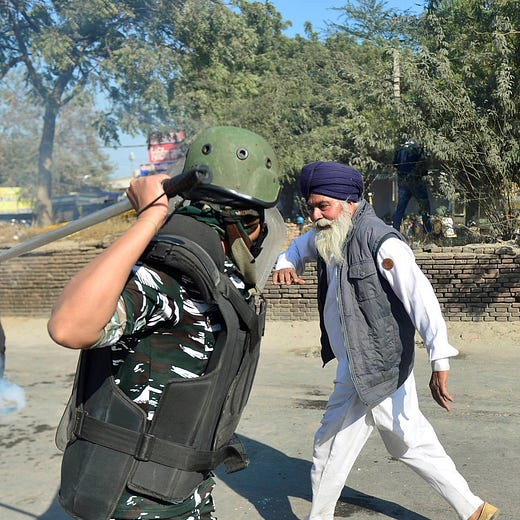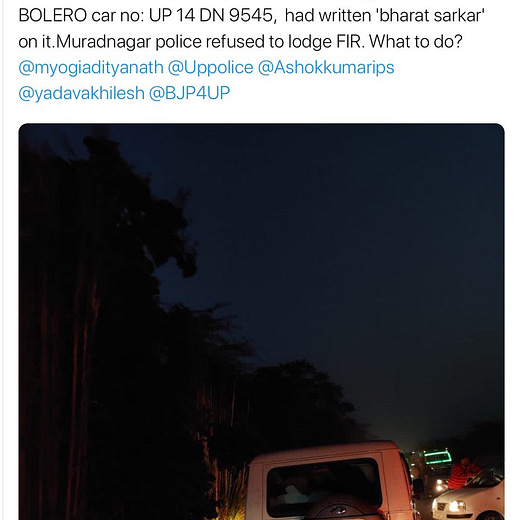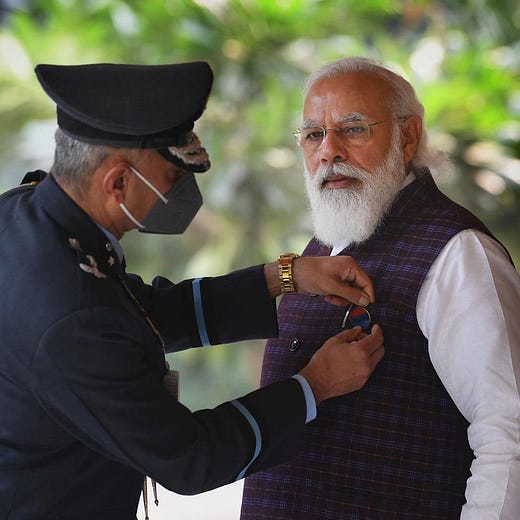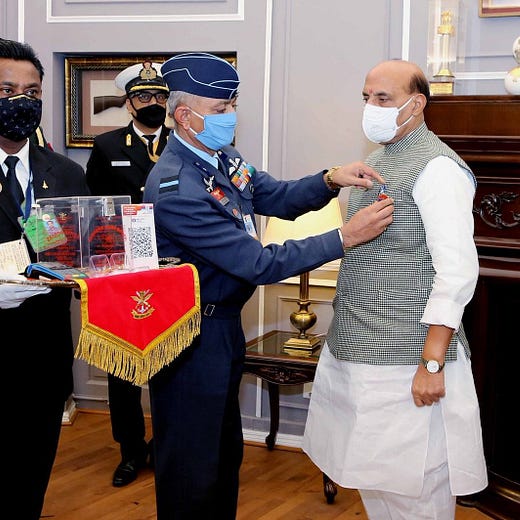The India Cable: After Bharat Bandh, Farmers May Dig In, Govt Launches PR Tuning Program
Plus: US lawmakers support right to protest, ‘land jihad’ fiction backfires, Taloja Jail makes spectacle of itself and new parliament has hundreds of empty seats. Who will fill them?
From the founding editors of The Wire—MK Venu, Siddharth Varadarajan and Sidharth Bhatia—and journalists-writers Seema Chishti, Sushant Singh and Tanweer Alam. Editor: Pratik Kanjilal
Snapshot of the day
December 8, 2020
Pratik Kanjilal
The agitating farmers who have encircled Delhi cut off the capital from the rest of India for four hours today, from 11 AM to 3 PM. Emergency services and wedding processions are allowed to pass during the Bharat Bandh. Elsewhere in the country, there are concerns about political parties taking advantage of the strike to further their own agendas. Krantikari Kisan Union President Darshan Pal has urged parties to join the stir today, but leave their party colours at home. And the Aam Aadmi Party protests that Delhi Chief Minister Arvind Kejriwal is under house arrest after visiting the protesters at the Singhu border. The Delhi Police said it is a routine deployment to prevent clashes between AAP and other parties. More such ‘routine deployment’ was seen elsewhere, too.
The PTI photo-journalist who took the defining image of these protests was allegedly attacked by certain persons travelling in a car with Government of India markings, and the local police refused to file an FIR. In Uttar Pradesh, of course.
Due to heavy taxation by the Modi government to shore up its depleting reserves, petrol prices in India are set to touch an all-time high, with a litre selling at Rs 83.71 in Delhi on Monday and Rs 90 in Mumbai. Striking farmers cite price rise as a contributing factor to their stir, which is focused on the withdrawal of three new laws which, they fear, will dismantle the Minimum Support Price system.
Hyderabad-based private pharma company Bharat Biotech has sought emergency use authorisation from the Indian drug regulator DCGI for its Covid-19 vaccine, Covaxin, even though Phase 3 trials have not been completed and questions have been raised about data shared earlier. The vaccine is being developed by Bharat Biotech in collaboration with the Indian Council of Medical Research. Stressing that the government’s ‘smart’ plan to inoculate only a critical section of the population will not halt the Covid pandemic, health experts feel that the decision seems to conceal its unwillingness to invest in universal immunisation.
As vaccine makers seek emergency use authorisation, the expert group setting delivery protocols has arrived at a benchmark. Shots will be given in batches of 100, and the vaccinator will spend at least half an hour on each recipient, to be able to track adverse reactions. The math seems impractical, since the process would take too long to cover large populations. Meanwhile, Trump is ramping up sanctions to deny Iran access to Covid vaccines. A few weeks ago, Iran’s health minister had announced that his country would get its vaccine from India – from a company headed by a Zoroastrian of Iranian descent, Adar Poonawalla’s Serum Institute of India. Either Modi will have to stand up to Trump, or wait till Biden comes.
The Yale philosopher Jason Stanley, author of How Fascism Works, finds a “non-accidental” resemblance between UP’s ‘love jihad’ laws and the Nuremberg laws of Nazi Germany, instituted in 1935 to ban marriages between Jewish citizens and ‘Aryan’ Germans.
Writer and free speech evangelist Salil Tripathi has returned to Twitter, after his suspended account was restored by the social media company following public outrage. And having jettisoned Trump after he was ejected from office, Prime Minister Narendra Modi has reached out to Europe for new friends. Mon ami, Macron?
Chinese strike via Myanmar
Indian security officials are alleging that China is providing assistance to armed rebel groups that have stepped up attacks on the border with Myanmar in recent months, opening another front in the conflict between two nations already engaged in a dangerous standoff in Ladakh. Groups in Myanmar – including the United Wa State Army and the Arakan Army, which was designated a terrorist organisation this year – are acting as Beijing’s proxies by supplying weapons and providing hideouts to insurgent groups in India’s northeastern states, according to Indian officials.
US lawmakers weigh in for Indian farmers
Adding to the discomfiture of the Modi government,several US lawmakers have voiced their support for farmers agitating in India against the new farm laws and urged that they be allowed to protest peacefully. These include Republican Congressman Doug LaMalfa, Democratic Congressmen Josh Harder and TJ Cox, and Congressman Andy Levin. The government has neither called the US Ambassador in New Delhi to issue a demarche nor issued a statement against the American lawmakers, the course it chose to follow when Canadian Prime Minister Justin Trudeau spoke in favour of the right to peaceful protest.
And as The India Cable had noted yesterday, the Modi government’s response to the demand made by 36 British MPs, amid protests in the UK in support of the agitating farmers in India, has also been radically different from its unduly sharp response to the Canadian PM. The Indian High Commission in London has acknowledged that the “protest by the farmers” against the new agricultural laws is “a part of a democratic process” and a “work in progress” in the “functioning democracy” of India. It also alleged that separatist forces, without mentioning Khalistani supporters in the protest in London on Sunday, are trying to take advantage of the agitation.
The statement added that the Government of India was in talks with the protesters and the dialogue was “still ongoing”. “Needless to say, it is an internal issue of India”, it said. The High Commission had also “comprehensively briefed” the relevant interlocutors in the UK government and Parliament on the “fundamental features of the path-breaking farming sector reform” initiated by the Government of India, according to Delhi. But Manoj Joshi notes that at least Canada and the UK are sensitive to their minorities, unlike India, which is seeing a systematic effort to marginalise and demonise its largest minority community, the Muslims.
Farmers prepared to escalate
Gearing up for the Bharat Bandh, the Railways feared blockades in 16 states and warned of “pro-left wing extremists” and Tamil chauvinist organisations joining the strike. Most farm unions have decided to further escalate their protest if the government does not accept their core demand. They may not participate in future talks. They hardened their stance because they felt that the Centre would stall the draft amendments proposed. The farmers are also peeved at ministers stressing that the farm laws would not be withdrawn, which is their core demand.
The farmers’ protest is shaping up as an electoral challenge for the National Democratic Alliance (NDA), since seven states where resentment about the new farm laws is growing are scheduled to hold assembly elections in the next two years – West Bengal, Uttar Pradesh, Kerala, Punjab, Uttarakhand, Tamil Nadu and Assam.
BJP’s ‘land jihad’ fib backfires, government backtracks
The BJP’s gleeful support for the court order quashing the 19-year-old Roshni Act in Jammu and Kashmir, alleging ‘land jihad’ by Muslims keen on settling in Jammu to change its Hindu-majority demography, has badly backfired. Lists of the Act’s beneficiaries that the government has released over the past fortnight under court orders reveal that the overwhelming majority in Jammu were non-Muslims. Jammu lawyer Sheikh Shakeel Ahmad, who had campaigned against the law for years but felt outraged when it was given a communal colour, said that of the 44,000 kanals (5,500 acres) encroached on in Jammu district, only 1,180 kanals (2.7%) had gone to Muslims.
In an affidavit filed on Friday, the Centre-controlled administration of the Union Territory has sought a review of the High Court’s October 9 order – which declared the Roshni Act unconstitutional and directed retrieval of the occupied plots – saying that it may “unintentionally” affect a large number of poor people. Earlier, the administration had publicly accused several senior Valley politicians, including former chief minister Farooq Abdullah, of being beneficiaries of the act, passed during Farooq’s tenure as chief minister. The politicians had denied the allegation.
Meanwhile, over 50% turnout was recorded in the fourth phase of the District Development Council (DDC) elections in J&K, but the total turnout in the Kashmir Valley was 31.95%, with Shopian recording only 1.96% voter turnout, the lowest in the Union Territory.
The Long Cable
Farmers won’t budge, but this may not be another Shaheen Bagh
Pratik Kanjilal
Last night, at the Ghazipur border in East Delhi, it was boys’ night out. The langars or communal kitchens had just closed, and thousands of farmers were taking a postprandial stroll on and under one of the biggest flyovers on the highway to Meerut. There were almost no women.
Volunteers carried masala chai and peanuts roasted in their shells through the crowd, and people scooped up fistfuls. Now and then, a roar of welcome went up as a fresh contingent of protesters arrived from Uttar Pradesh. Tractor trailers loaded with packaged blankets and quilts arrived, too, but they were hardly noticed. Far ahead, there was a van supplying toothbrushes and paste, but it had no custom. On the eve of the Bharat Bandh, no one was in the mood to turn in.
Delhi’s Singhu border is the epicentre of the farmers’ stir, and is dominated by contingents from Punjab. Most of the media coverage is coming from that spot, and state Chief Minister Arvind Kejriwal chose to visit it, over other points of entry to the capital, which face Uttar Pradesh. The one on the Ghazipur border in East Delhi reveals a more complex reality ― farmers who are engaged in other trades, and who vote BJP though they wear the green and white caps of Mahendra Singh Tikait’s Bharatiya Kisan Union. For them, the three farm laws are only the focus of the agitation. Rising input costs and inflation are equally galling.
The National Capital Region, a territory which was mostly farmland until about 30 years ago, has been utterly changed by runaway urbanisation. The sale of land to developers enriched villagers overnight, and they have invested the proceeds in modern homes in the region, or even in the capital. Some have sought upward mobility through other professions, like Gulshan Bhatia of Ghaziabad, who is a stockbroker and wears a gold watch. At the other end of the social scale is Om Pal, who was a farmer but now serves as a contract worker in the wholesale market nearby. Nevertheless, they identify as farmers because they still hold agricultural land, or their families are still farming.
Issues they identify as serious are conditioned by who they are. Last night at Ghazipur, Jogendra Singh, a farmer in the classical mould from Muzaffarnagar, complained about the high cost of electricity and differential access to irrigation water – issues that have been contentious from the time of Tikait, when protesters camping in Delhi’s Boat Club smoked hookahs. Om Pal is agitated because he does not get ‘zero electricity bills’ like the AAP has instituted in Delhi – an urban phenomenon. And Bhatia speaks of high fuel costs which slash farmers’ margins, and surprisingly, of the jump in healthcare costs which resulted when hospitals switched from subsidies to insurance. Perhaps not so surprising, for this could be an issue in rural areas on the highways, where private medical clinics have proliferated.
The BKU is very visible on the eastern border of Delhi but interestingly, a large number of the protestors camped here are BJP supporters by conviction, or BJP voters because of the TINA factor ― There Is No Alternative offered by the Opposition. Mayawati’s Bahujan Samaj Party never recovered from the blow of demonetisation ― at the time, many in Lucknow believed that her decimation was the specific purpose of the intervention. And few of the protesters have any confidence in the future of the Samajwadi Party.
But they see no conflict between their electoral choice and the present agitation, which is embarrassing the BJP both at home and abroad, as it finds it impossible to step out of the corner which Narendra Modi’s rhetoric has painted it into. Some insist this is an “issue-based movement”, solely to defend the old system of agricultural procurement. Others, more forthrightly, call it an “aapsi maamla”, a family matter to be resolved within the fold.
The protesters have been extremely circumspect. They have never come into conflict with the security forces. Indeed, the police are frequent guests at their langars. Their rhetoric has been tempered, and they have not spoken ill of the ruling party. They do not want Opposition parties to bring their banners to the bandh. And its timing today was specifically chosen to avoid inconveniencing people commuting to work, said agitators. No one seeks a confrontation, but no one is inclined to budge, either. “We can hold out for months,” said one agitator. “This is how we live in the sowing season, in the open fields. It is no hardship.” But this is not necessarily the beginning of another Shaheen Bagh, because the farmers are not instinctively opposed to the ruling party, but only to specific state policies which limit their prospects.
Prime Number: Five millionThat’s the number of potential workers who have left the labour force entirely, as per the Centre for Monitoring Indian Economy. Mahesh Vyas explains that the labour force (the sum of employed and the unemployed who are actively looking for work) has shrunk by about 16 million, but the greater labour force (which includes the labour force and the unemployed who are willing to work but are not actively looking for work) has not shrunk as much. In November 2020, the labour force was estimated at 421 million compared to 437 million in 2019-20. This 16 million fall implies a 3.6% shrinkage. The greater labour force in November 2020 was 443.5 million compared to 448.4 million in 2019-20. This is smaller by 4.9 million or 1.1%.Still locked down
The KISLAY Social Research Collective conducted a snap survey of 224 daily wage workers in Dehradun, Uttarakhand and Delhi in the month of November, 2020. The ill effects of the lockdown dominate their lives. Two-thirds said they had trouble getting food. Wages were down for two-thirds and 81% still had financial trouble. It’s a dipstick with worrying implications.
No problem, amp up the PR
The Central government is doing exactly what it must, in the middle of a massive public health crisis, trouble in the neighbourhood and a crashing economy ― it is perfecting its PR.
The government is “working on a new strategy to overhaul its media and public outreach, with a group of ministers comprising nine Union ministers recommending a focus on 10 key areas, as well as detailing ways in which criticism can be addressed and positive messaging can be spread wider.” It is a ‘multi-pronged’ strategy, it appears, and "the GoM also proposed to identify journalists who have lost their jobs recently who are “supportive of the government or are neutral”, so that their services could be utilised by various ministries." How criticism can be addressed and positive messaging amplified by “constantly tracking 50 negative influencers” and “positive influencers” has the full attention of the government. Why is this even necessary? Read this detailed piece in The Caravan on how ‘mainstream’ newsrooms have already fallen in line.
In May, the government had decided to constitute an Index Monitoring Cell to look at how India’s place in the World Press Freedom Index could be salvaged. It stands at 142 amongst 180 countries, one step lower than Swaziland. The Centre’s PR notwithstanding, international indices on hunger, democracy, the state of the economy and women’s safety are on a sharply downhill journey, causing concern in a government which seeks tight control over the mainstream press narrative.
Taloja Jail makes spectacle of itself
Gautam Navlakha, who has been made an accused in the Elgar Parishad-Koregaon Bhima case and lodged in Taloja prison, had his spectacles “stolen” in jail, causing acute discomfort because of his extremely poor eyesight. The theft occurred on November 27 and he has yet to get a new pair of glasses. His partner, Sahba Hussain said that Navlakha, who will turn 70 next year, is “almost blind” without the spectacles and yet, when she sent him a new pair of glasses by post earlier this month, the prison authorities refused to accept them.
Stung by the adverse media coverage – which comes in the wake of another Bhima-Koregaon prisoner, the 83-year-old Stan Swamy, being denied a sipper and straw – jail authorities have apparently now agreed to receive Navlakha’s spectacles and hand it over to him.
A Chinese phone is proudly Indian
How Indian is an Indian phone? Facing a nationalist backlash in India following tensions on the Ladakh border, Chinese mobile manufacturer Xiaomi has rebranded itself as a local manufacturer in India. As India’s biggest selling smartphone manufacturer, its stores have ‘Made in India’ posters and its India head, Manu Kumar Jain, is helming the change.
Deep dive
In the new Parliament building for which Prime Minister Modi will lay the foundation stone on Thursday, the Lok Sabha chamber will have a seating capacity for 888 members, while the Rajya Sabha will have 384 seats for. At present, the Lok Sabha has a sanctioned strength of 543 members and Rajya Sabha of 245. If the Lok Sabha only has 543 members, why does its new chamber need 888 seats? Or is it that there are likely to be more Lok Sabha members in the near future? Rohan Venkat explores the proposition which would certainly place the more developed southern states at a huge disadvantage compared to populous Hindi-speaking states like Uttar Pradesh.
Op-Eds you don’t want to miss
The Attorney-General spends his time processing applications for contempt rather than arguing major constitutional cases because they are not posted, and the court has to battle not for our freedoms but for its credibility, laments Sriram Panchu, as he calls out the courts for abandoning their charge as sentinels of the law and freedoms.
A robust legal framework guarantees an individual the freedom to worship a god of his or her choice and marry based on love, argue KTS Tulsi and Tanessa Puri. They say that the UP government’s institution of a so-called ‘love jihad’ law is illegal, for it will deny citizens their choice in a deeply personal domain, which is protected by the Constitution.
Jean Dreze writes on urban employment for the poor, prioritising women. To facilitate women’s involvement, most of the work could be organised on a part-time basis, perhaps four hours a day.
Gopalkrishna Gandhi says that if the farmers’ protest remains peaceful and does not get co-opted into other agendas, it can be a landmark in India’s agrarian history. It is not for nothing that in his great song, Rabindranath Tagore commenced naming India’s regions with the Land of the Five Rivers.
Compartmentalisation between classes has been growing, but the pandemic has accelerated this process: now, there are new justifications for old excuses to further marginalise the poor and shove them to the rim of daily urban existence, says Ruchir Joshi.
Listen up
Sanjib Baruah joins Srinath Raghavan in the Interpreting India podcast to unpack the Naga peace negotiations and the recent setbacks. They explore the factors affecting the positions of various stakeholders. Further, they ask, what shall happen to the peace process if the antagonism between the government and the NSCN(IM) persists?
Watch Out
Dedicated to the Farmers of India ― the providers of India ― a creative collaboration between Perumal Murugan and TM Krishna. Were you told that the movement is just pure Punjab? Watch this.
Tailpiece
A couple decided to get married even after the bride tested positive for coronavirus on the wedding day. A video shared on social media shows them wearing personal protection equipment (PPE) as they perform wedding rituals. The priest and the sole guest who attended also wore PPE suits.
Public service announcement: Please wear a mask. And properly.
That’s it for today. We’ll be back with you tomorrow, on a device near you. If The India Cable was forwarded to you by a friend (perhaps a common friend!) book your own copy by SUBSCRIBING HERE.










